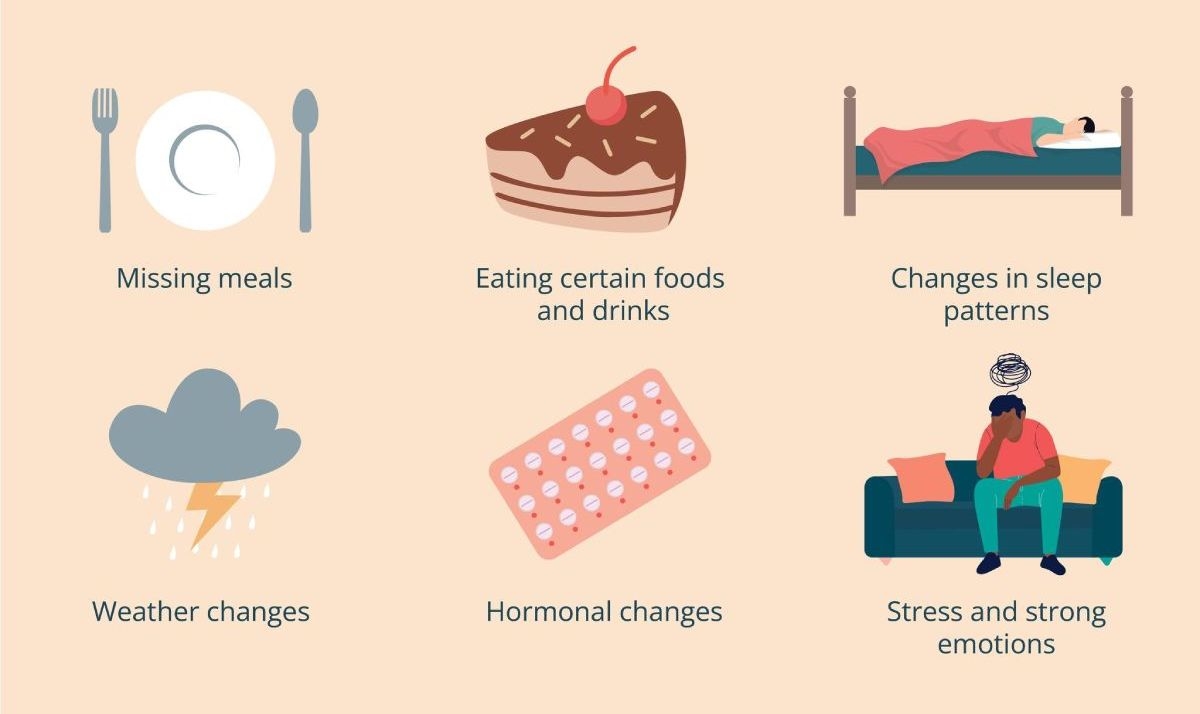Patients and healthcare professionals face unique challenges presented by abdominal migraine, a lesser-known form of the condition. Unlike the commonly associated throbbing headaches with migraines, abdominal variants primarily manifest in the abdomen. This article comprehensively explores abdominal migraines. It covers their symptoms, and potential causes, focusing on genetic factors and triggers such as stress or diet changes, and an array of available treatments ranging from medication to lifestyle modifications for effective management.
Abdominal Migraine Symptoms
Presenting a diverse array of symptoms, abdominal migraines often escape immediate recognition and potentially result in misdiagnosis. To understand the complexity of this condition fully, you must delve into each symptom's nuances, grasping how they collectively contribute to the daunting experience that individuals with abdominal migraines endure.
- Recurrent Episodes of Abdominal Pain:
Recurrent episodes of moderate to severe abdominal pain, typically throbbing or pulsating in nature and manifesting around the belly button signify the hallmark of abdominal migraines. The variation in its character from person to person and even episode-to-episode, presents a challenging aspect for interpretation by both patients and healthcare providers.
- Nausea and its Intricate Connection:
Individuals with abdominal migraines often experience profound and persistent nausea, accompanying their abdominal pain. The overall experience does not merely include mild discomfort. It incorporates an extra layer of distress. The contextually complex p between this type of abdominal pain and concurrent nausea seems to share a close interplay, thereby intensifying the impact on individual well-being overall.
- Vomiting as a Distinctive Feature:
Sometimes, abdominal migraines escalate in intensity to induce prominent vomiting. Vomiting not only intensifies physical strain but also fuels a distress cycle that may potentially trigger further symptom exacerbation. Crucially understanding the triggers for vomiting in abdominal migraines informs the development of targeted interventions aimed at alleviating this distressing aspect of the condition.
- Loss of Appetite and its Implications:
Often, the notable loss of appetite follows recurrent episodes of abdominal pain that accompany nausea and vomiting. This symptom can cascade to affect an individual's overall health and well-being. Nutritional deficiencies may emerge, thereby complicating abdominal migraine management. A comprehensive treatment plan necessitates addressing the root causes of appetite loss and executing strategies for maintaining adequate nutrition.

- Debilitating Impact on Daily Life:
Recurrent abdominal pain, nausea, vomiting, and loss of appetite culminate these symptoms into a perfect storm that significantly debilitates daily life. The unpredictable nature of abdominal migraines disrupts work, social engagements, and familial responsibilities. It extends its impact beyond the physical realm to influence mental and emotional well-being.
- The Onset and Duration of Abdominal Migraines
Individuals' variabilities in the onset of abdominal migraines pose a challenge to predicting when an episode might occur. Some experience symptoms gradually intensifying, while others are caught off guard by sudden and intense pain. Moreover, complicating both diagnosis and management, the duration range for these conditions extends from a few hours to several days.
Causes of Abdominal Migraines
Several factors believably contribute to the development of abdominal migraines, although the exact causes remain unclear.
A role in this is played by genetic predisposition, experiencing abdominal migraines becomes more likely when there's a family history of traditional migraines. Moreover, abnormalities in brain function and chemical pathways could contribute to initiating these types of headaches.
- The Role of Gut-Brain Connection
Recent research implies a robust gut-brain axis connection, which in turn influences abdominal migraine occurrences. Imbalances in gut bacteria coupled with intestinal inflammation or sensitivity to specific foods likely contribute to the development of these migraines.
It is crucial to comprehend this complex relationship for the formulation of targeted treatments that mitigate the root causes underlying this condition.
Triggers for Abdominal Migraines
Pivotal triggers initiate abdominal migraines, requiring management strategies tailored to the individual. Unraveling these mysteries fosters an effective collaboration between healthcare professionals and individuals.
Key triggers encompass certain foods, stressors such as emotional upheavals, environmental changes or physical exertion, and hormonal fluctuations, particularly in girls approaching puberty:

- Environmental Factors: Barometric pressure shifts can trigger weather changes. Proactive measures such as lifestyle adjustments minimize the impacts of these triggers.
- Stress: We recognize chronic or acute stress as a trigger. Techniques such as meditation, when employed to manage stress, actively break the cycle of migraines induced by stress.
- Dietary Triggers: Chocolate and caffeine, among certain foods, potentially trigger specific responses. By actively collaborating with healthcare professionals. We can effectively identify these dietary triggers leading to their elimination, thus mitigating the associated risks.
- Hormonal Fluctuations: During hormonal changes, triggers may affect women.
- Sleep Disturbances: Abdominal migraines result from the contribution of irregular sleep patterns.
Treatment Options for Abdominal Migraine
A multifaceted approach effectively manages abdominal migraines. It combines lifestyle modifications. Preventive measures such as identifying triggers implementing stress reduction techniques, and acute symptom relief strategies. Empowering individuals to actively manage their condition and enhance their quality of life hinges on understanding the diverse range of treatment options available.
Lifestyle Modifications and Triggers Management
Identifying and addressing lifestyle factors that potentially contribute to abdominal migraines constitutes a crucial treatment aspect.
This involves the adoption of stress-management techniques, the maintenance of regular sleep schedules, and dietary adjustments. These are all pivotal in proactive trigger management, an approach that may significantly diminish both the frequency and severity of abdominal migraine episodes.
Preventive Medications and Therapies
Individuals who frequently and severely experience abdominal migraines may receive a recommendation for preventive medications. These drugs aim to decrease the frequency and intensity of episodes.
Furthermore, promising results have emerged from therapies like biofeedback, cognitive-behavioral therapy, and acupuncture in preventing or alleviating symptoms related to abdominal migraines. A consultation with a healthcare professional to explore these options can facilitate the customization of a treatment plan according to an individual's specific needs.
Acute Symptom Relief Strategies
During an episode of abdominal migraine, prioritizing acute symptom relief is crucial. Managing acute symptoms commonly involves strategies like using over-the-counter pain medications and anti-nausea drugs, combined with rest.
In more severe cases, however, doctors may prescribe prescription medications such as triptans for better results. Individuals who grasp the available options for immediate relief feel empowered, enabling them to navigate their episodes with heightened confidence.
A Holistic Approach to Manage Abdominal Migraine
To conclude, abdominal migraines present unique challenges demanding a thorough and tailor-made strategy for diagnosis and management. Understanding the symptoms, investigating potential causes, and evaluating diverse treatment options enable individuals with healthcare expertise to enhance the overall well-being of those suffering from abdominal migraines through collaborative efforts.
We must foster an all-encompassing approach that includes lifestyle adjustments, preventative measures, along acute relief strategies. This will empower individuals towards effective self-management of this intricate condition thus restoring control over their health status.




